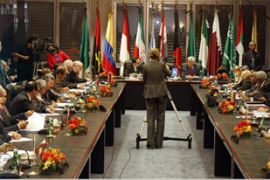Opec signals ‘no change’ to output
Oil producers meeting in Vienna recommend extraction levels remain at current levels.

Non-Opec members such as Russia have not been invited to the talks this time.
Moscow failed to cut production following the December meeting, despite a pledge from Igor Sechin, the Russian deputy prime minister, to do so.
Russia even surprised investors by selling more oil and refined products like gas oil.
Output cut
At the same time, Riyadh implemented its biggest output production cut ever, bring extraction down to just over eight million barrels a day.
| In video |
|
|
The result, according to Bloomberg data, is that Russia has now surpassed Saudi Arabia for the title of biggest oil producer.
Speaking to Al Jazeera, Julian Lee, an energy analyst at the Centre for Global Energy Study in London, said: “[Russia is] increasing production because the companies that operate in Russia are continung to invest in new exploration and development.
“There have been four or five fairly large new fields that have all come into production over the last 12 months and are now ramping up to their peak levels and that is really what has driven it.
“More recently Opec has been making approaches to Russia, I think Russia sees no benefit in joining Opec, it’s a very powerful nation independently in its own right.
“Opec membership, I think rightly it assumes, would compel it to abide by production decisions that were out of its control and it has absolutely no desire to do that.”
Russian dominance
Francisco Blanch, an expert at Bank of America Merrill Lynch, said it was purely financial considerations that led Russia to break its production-cutback promises.
“Russia has got some serious budgetary issues from a government standpoint.
“The only way to expand your revenues is by taking more barrels out of the ground and on to the market”, he told Bloomberg.
In the first quarter of 2009, Vladimir Putin, Russia’s prime minister, offered tax concessions to national energy companies tapping new fields, such as Lukoil and Rosneft.
The strategy allowed Russia to gain market share in the lucrative United States market – the world’s largest – and exports to the country jumped by a third in the first six months of the year.
Saudi shipments have dropped 29 per cent over the same period.
Reacting to the change in Opec’s fortunes, Abdalla El-Badri, Opec secretary-general, said: “We are very disappointed. As far as Opec member countries are concerned, this situation is not really in interests of producers or consumers.”
